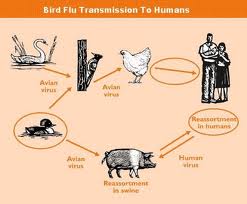Avian Influenza has received significant attention in the media: some articles label it as the new threat in influenza viruses, while others dismiss it as ” only a flu that will infect birds.” Outbreaks have been reported mainly from Asia, but the nasty virus has made it into poultry farms in North America. There is concern that avian influenza could be transmitted from uncooked birds or bird products onto humans. Avian influenza A has indeed been detected in imported frozen duck meat and infected poultry eggs.
Of particular concern is the virus strain H5N2, as it has the propensity to mutate rapidly. At this point the risk of human-to-human, and transmission remains low, but acquiring the infection from sick birds is a reality. The course tends to be more severe in people older than 12 years, while the disease in children tended to be milder and self-limiting. The symptoms in the adult age group presented as follows:
-Fever (100% of the affected patients)
-Upper respiratory tract infections (67%)
-Pneumonia (58%)
-Gastrointestinal symptoms (50%)
Abnormal laboratory test results were:
-Elevated serum aminotransferases (50%)
-Pancytopenia and bone marrow hemophagocytosis (16%)
Guidelines from the Center for Disease Control suggest that travelers to countries experiencing outbreaks of avian flu should avoid areas with live poultry (live animal markets or poultry farms).
Hand hygiene in the form of soap and water or alcohol-base hand sanitizers is important. All poultry products should be cooked, as heat is effective in killing viruses. It is also important to inform the health care provider about flu-like symptoms associated with recent travel; so avian influenza can be considered.
The current influenza vaccines have no protective value against the avian flu. Studies suggest that anti-viral prescription medication may work. As the viruses are becoming resistant to current medications, they are expected to have limitations in successful treatment.
More info about the Flu: http://nethealthbook.com/infectious-disease/respiratory-infections/flu/
Reference: The Canadian Journal of CME, April 2005, page 49
Look for more info about the bird flu at the CDC site of the US
Last edited October 28, 2014






